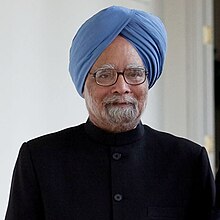Manmohan Singh
| Manmohan Singh | |
|---|---|
| ਮਨਮੋਹਨ ਸਿੰਘ | |

Manmohan Singh
|
|
| 13th Prime Minister of India | |
|
In office 22 May 2004 – 26 May 2014 |
|
| President |
A. P. J. Abdul Kalam Pratibha Patil Pranab Mukherjee |
| Preceded by | Atal Bihari Vajpayee |
| Succeeded by | Narendra Modi |
| Leader of the Opposition in the Rajya Sabha | |
|
In office 21 March 1998 – 21 May 2004 |
|
| Prime Minister | Atal Bihari Vajpayee |
| Preceded by | Sikander Bakht |
| Succeeded by | Jaswant Singh |
| Minister of Finance | |
|
In office 21 June 1991 – 16 May 1996 |
|
| Prime Minister | P. V. Narasimha Rao |
| Preceded by | Yashwant Sinha |
| Succeeded by | Jaswant Singh |
| Deputy Chairman of the Planning Commission | |
|
In office 15 January 1985 – 31 August 1987 |
|
| Prime Minister | Rajiv Gandhi |
| Preceded by | P. V. Narasimha Rao |
| Succeeded by | P. Shiv Shankar |
| Governor of the Reserve Bank of India | |
|
In office 15 September 1982 – 15 January 1985 |
|
| Preceded by | I. G. Patel |
| Succeeded by | Amitav Ghosh |
| Member of Parliament (Rajya Sabha) | |
|
Assumed office 1991 |
|
| Constituency | Assam |
| Personal details | |
| Born |
26 September 1932 Gah, Punjab, British India (Present-day Punjab, Pakistan) |
| Political party | Indian National Congress |
| Spouse(s) | Gursharan Kaur (m. 1958) |
| Children | Upinder, Daman, Amrit |
| Alma mater |
Panjab University, Chandigarh St John's College, Cambridge Nuffield College, Oxford |
| Profession | Economist, bureaucrat |
| Religion | Sikhism |
| Signature |  |
Manmohan Singh (Punjabi: [mənˈmoːɦən ˈsɪ́ŋɡ]; born 26 September 1932) is an Indian economist and politician who served as the Prime Minister of India from 2004 to 2014. The first Sikh in office, Singh was also the first prime minister since Jawaharlal Nehru to be re-elected after completing a full five-year term.
Born in Gah (now in Punjab, Pakistan), Singh's family migrated to India during its partition in 1947. After obtaining his doctorate in economics from Oxford, Singh worked for the United Nations during 1966–69. He subsequently began his bureaucratic career when Lalit Narayan Mishra hired him as an advisor in the Ministry of Foreign Trade. Over the 70s and 80s, Singh held several key posts in the Government of India, such as Chief Economic Advisor (1972–76), Reserve Bank governor (1982–85) and Planning Commission head (1985–87).
In 1991, as India faced a severe economic crisis, newly elected Prime Minister P. V. Narasimha Rao surprisingly inducted the apolitical Singh into his cabinet as Finance Minister. Over the next few years, despite strong opposition, he as a Finance Minister carried out several structural reforms that liberalised India's economy. Although these measures proved successful in averting the crisis, and enhanced Singh's reputation globally as a leading reform-minded economist, the incumbent Congress party fared poorly in the 1996 general election. Subsequently, Singh served as Leader of the Opposition in the Rajya Sabha (the upper house of India's Parliament) during the Atal Bihari Vajpayee government of 1998–2004.
...
Wikipedia
